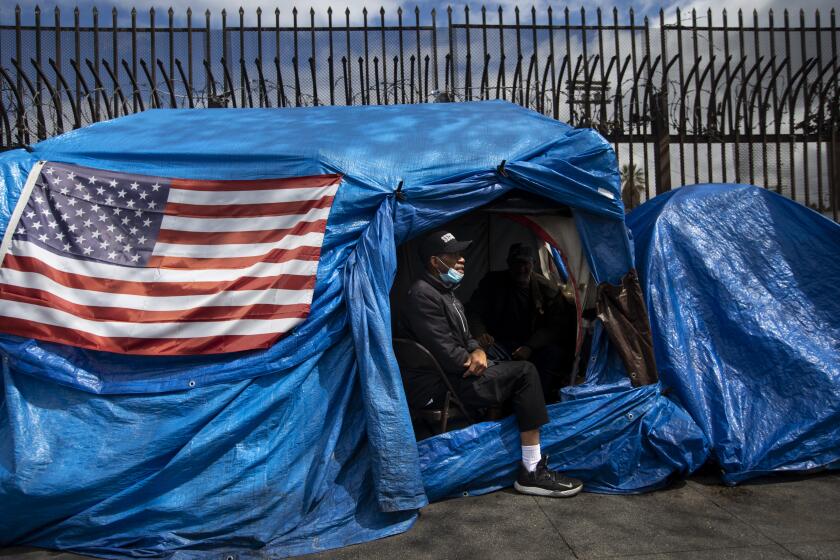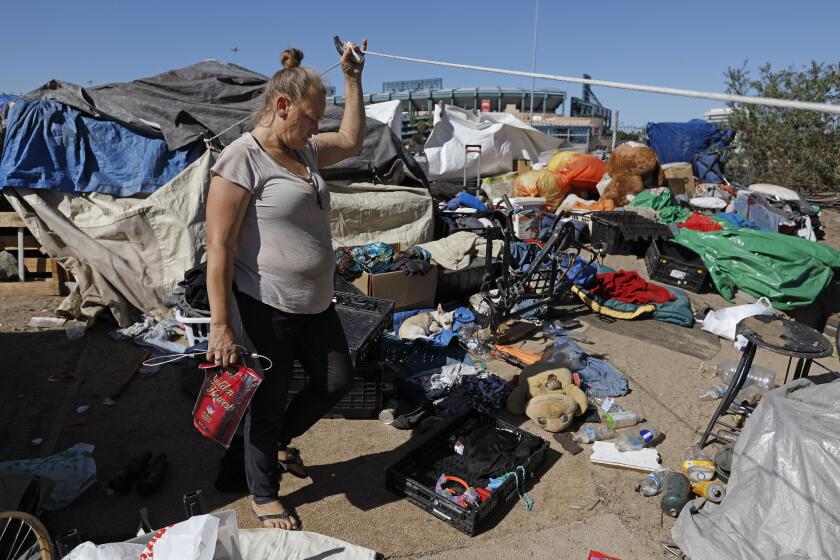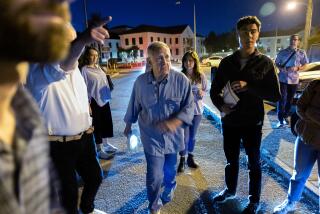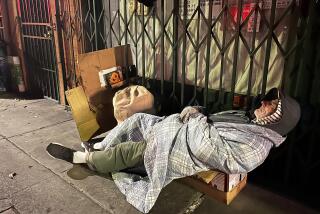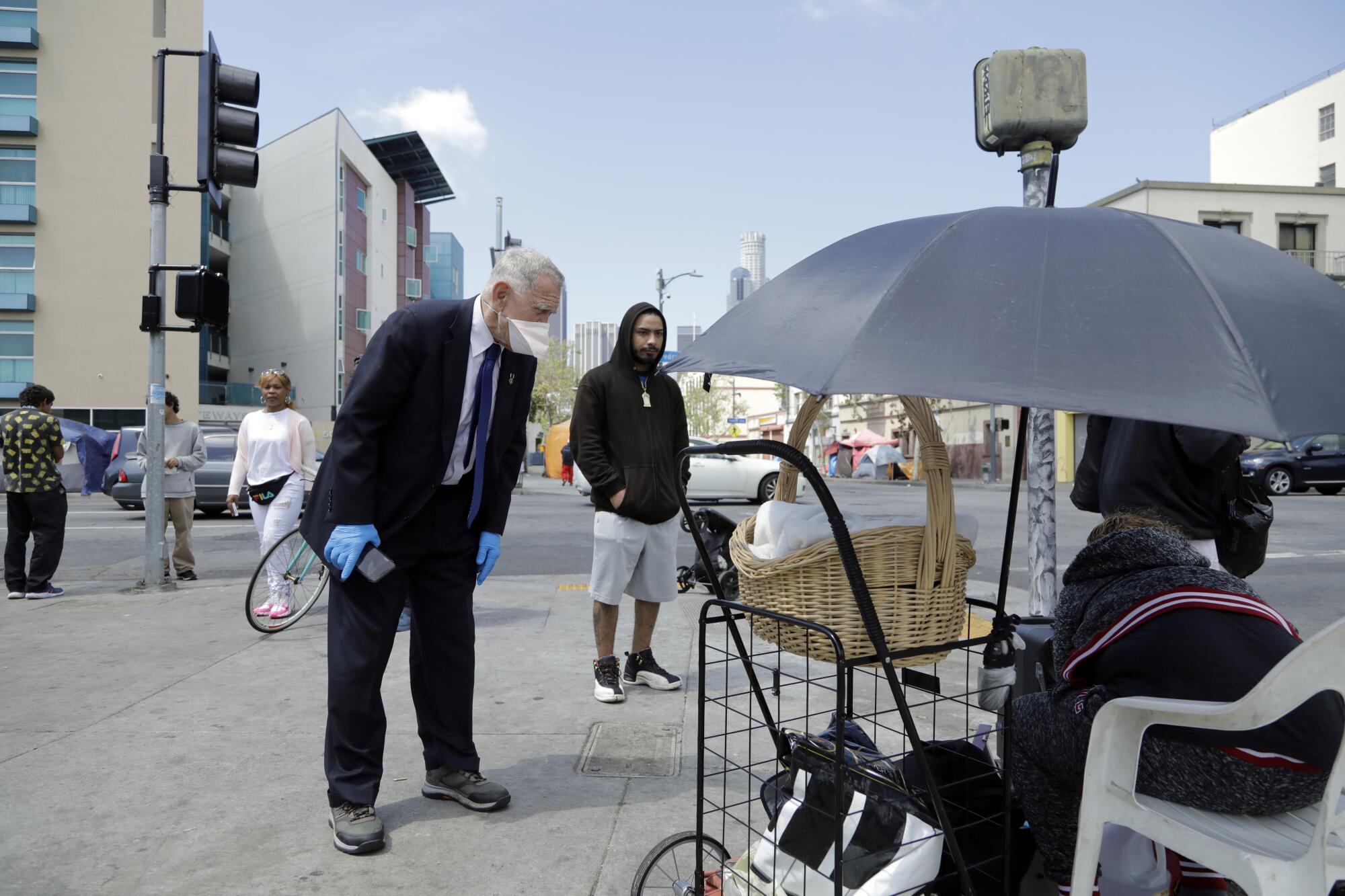
Los Angeles — “Anybody want to test my accountability by walking with me in a few moments down to skid row?”
U.S. District Judge David O. Carter leveled the question at a room full of attorneys on a recent Tuesday afternoon.
“Do you all believe me, or do you want to see it?” he pressed. “Do you want to see it?”
At 76 years old, Carter knows he should be at home and away from people, not in a cavernous ballroom in the basement of the Alexandria Hotel surrounded by attorneys and journalists, or outside leading a tour of the largest concentration of homeless people in the country. Public officials have warned that his age puts him at high risk for contracting the coronavirus and dying of COVID-19.
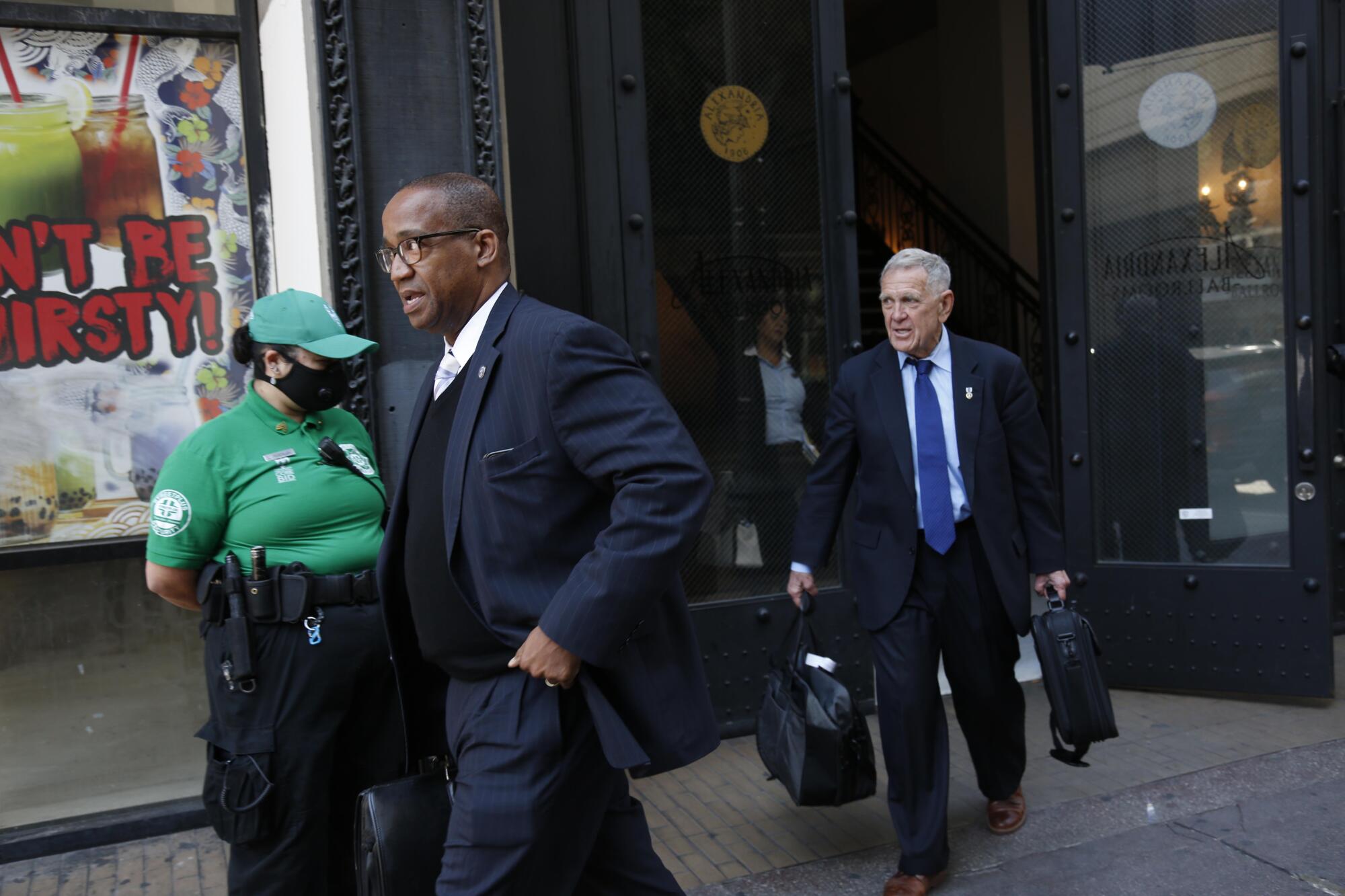
But as the pandemic has unfolded, Carter, long known as brash, verbose and stubbornly hands-on, has been on a mission to force changes in the living conditions for the homeless people of L.A.
He is the judge assigned to a lawsuit filed last month against the city and county of Los Angeles by the L.A. Alliance for Human Rights. The group of business owners and downtown residents, among others, is demanding solutions to what they see as unsafe and inhumane conditions in encampments — especially given the pandemic.
On this particular Tuesday, two attorneys representing the county and several others representing advocacy groups decided to take Carter up on his offer to see whether the new hand-washing stations on skid row actually worked. In court, Carter had been frustrated that the stations the city was touting didn’t have water in them. He knew many were empty because he had checked them earlier.
So for two hours, the group marched around the squalor of skid row in the rain. Carter’s determined gait left other, much younger people scrambling to keep up, shivering in their soaked business attire.
He led them from station to station, demonstrating which ones worked and which ones didn’t. He wore gloves, but then shook the hands of several homeless people. Although he had on an N95 mask, he would pull it back so people could hear him. He also often stood closer to others than the recommended distance of six feet.
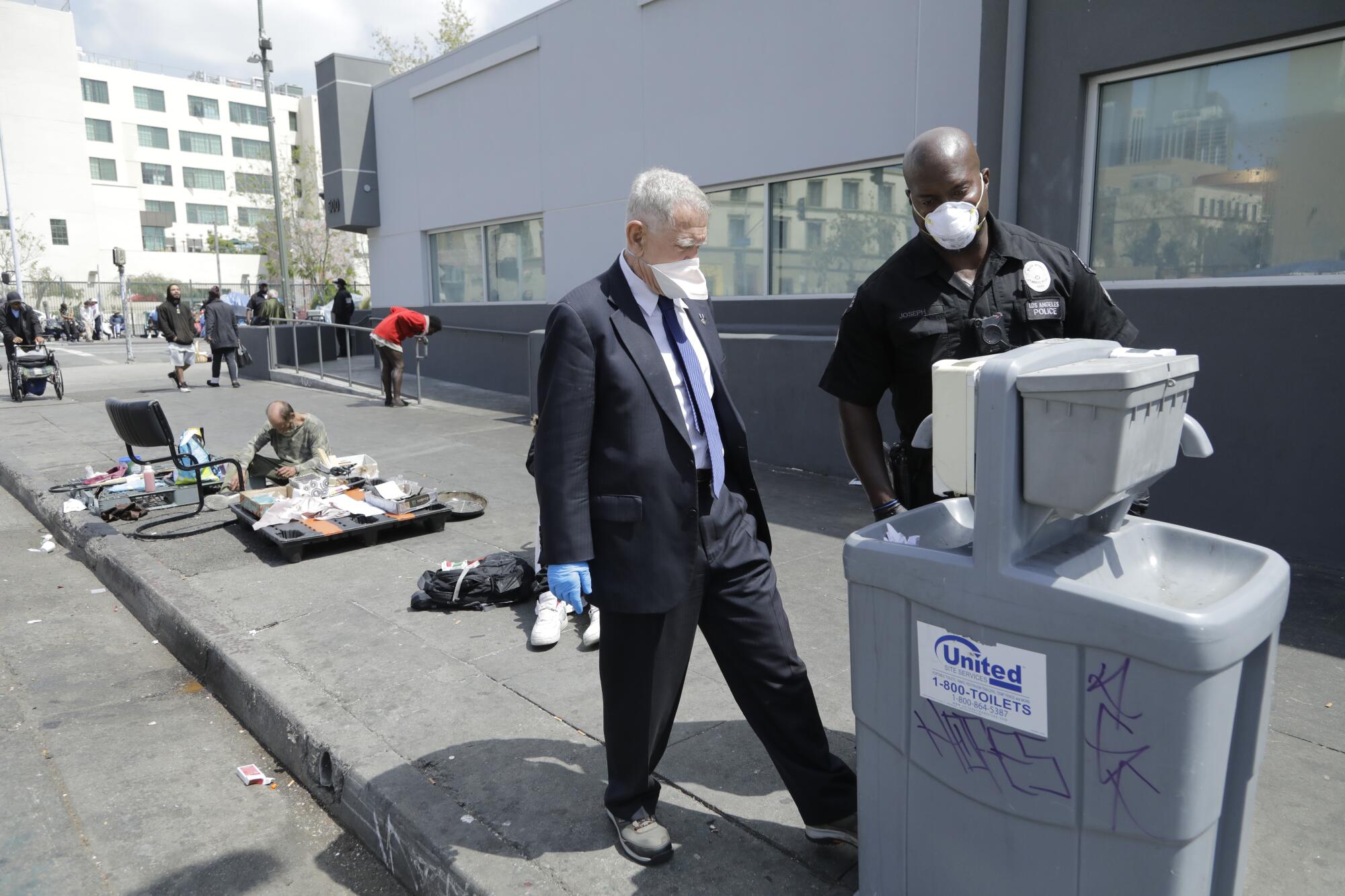
Carter declined to explain on the record to The Times why he continues to put himself in danger, but he did say he has started getting tested regularly for the coronavirus (he’s negative) and is taking social distancing seriously, along with wearing a mask and gloves.
His wife, Mary Ellen Carter, said she is sleeping in a separate bedroom as a precaution. Last month, their grandchildren left him a birthday gift on the front porch and then ran behind their picket fence to sing him happy birthday.
But she said those sacrifices were small compared with the size of her husband’s mission.
“The fun thing about Dave is there’s always change when he’s involved. He reminded me, everyone [in government] says, well, they should be doing this and they should be doing that. There’s no leadership,” Mary Ellen Carter said. “They need some leader to take this on and say, ‘OK, this is what we’re going to do.’ ...Because there’s a lawsuit, it gives him a chance to come in and say this is what he needs done.”
Carter’s close associates, including a longtime friend from his stint as a Marine, suspect that the judge simply found it unacceptable to sit alone in his chambers or his house as the pandemic is playing out on the street.
Far from being a martyr, they say Carter merely sees the coronavirus as an opportunity to help homeless people in a way that hasn’t happened through decades of public policy and litigation between advocates and the city and county.
U.S. District Judge David O. Carter, long known as brash, verbose and stubbornly hands-on, has been on a mission to force changes in the living conditions for the homeless people of L.A.
“He’s trying to impress on people that they can’t be in a bubble when the people out there are not... This is real. This is flesh and blood,” said Laurie Levenson, a professor at Loyola Law School at Loyola Marymount University. “This will be seen as masterful. As long as nobody [in his courtroom] gets sick.”
::
Carter is known for wanting to be in the thick of things.
He’s rarely content to sit back and just file rulings. He begins sending emails and making calls to elected officials and business leaders before the sun rises. In the past, he has convened his courtroom on a Santa Ana riverbed and he regularly visits homeless encampments.
A federal judge since 1999, Carter made a name for himself in 2018 when he presided over a case brought by homeless advocates in Orange County. The county and the cities of Anaheim, Costa Mesa and Orange wanted to clear encampments along a three-mile stretch of the Santa Ana River Trail in 2018. Advocates sued.
The defendant, facing prison for violating his probation, stood in a federal courtroom asking for another chance.
Carter helped oversee a settlement, in which more than a dozen cities in northern Orange County agreed to create enough shelter beds for a specific percentage of the local homeless population.
As a result of the lawsuit, about 1,200 beds have been added or are in the pipeline, even in cities that once resisted shelters, according to attorney Carol Sobel, who worked on behalf of advocates in the Orange County case and is now involved in the Los Angeles case. About 1,500 units of new permanent housing have been approved, she said.
Separately, Carter also tangled with several wealthy cities in southern Orange County that enforced anti-camping laws by sending homeless people to poorer parts of the county in the north. Those cities refused to settle, retained lawyers from Jones Day and succeeded in having Carter removed from the case, because he had made comments that could be perceived as biased and because of the way he communicated with public officials.
The case brought by cities in southern Orange County was later dismissed, though the plaintiffs are appealing.
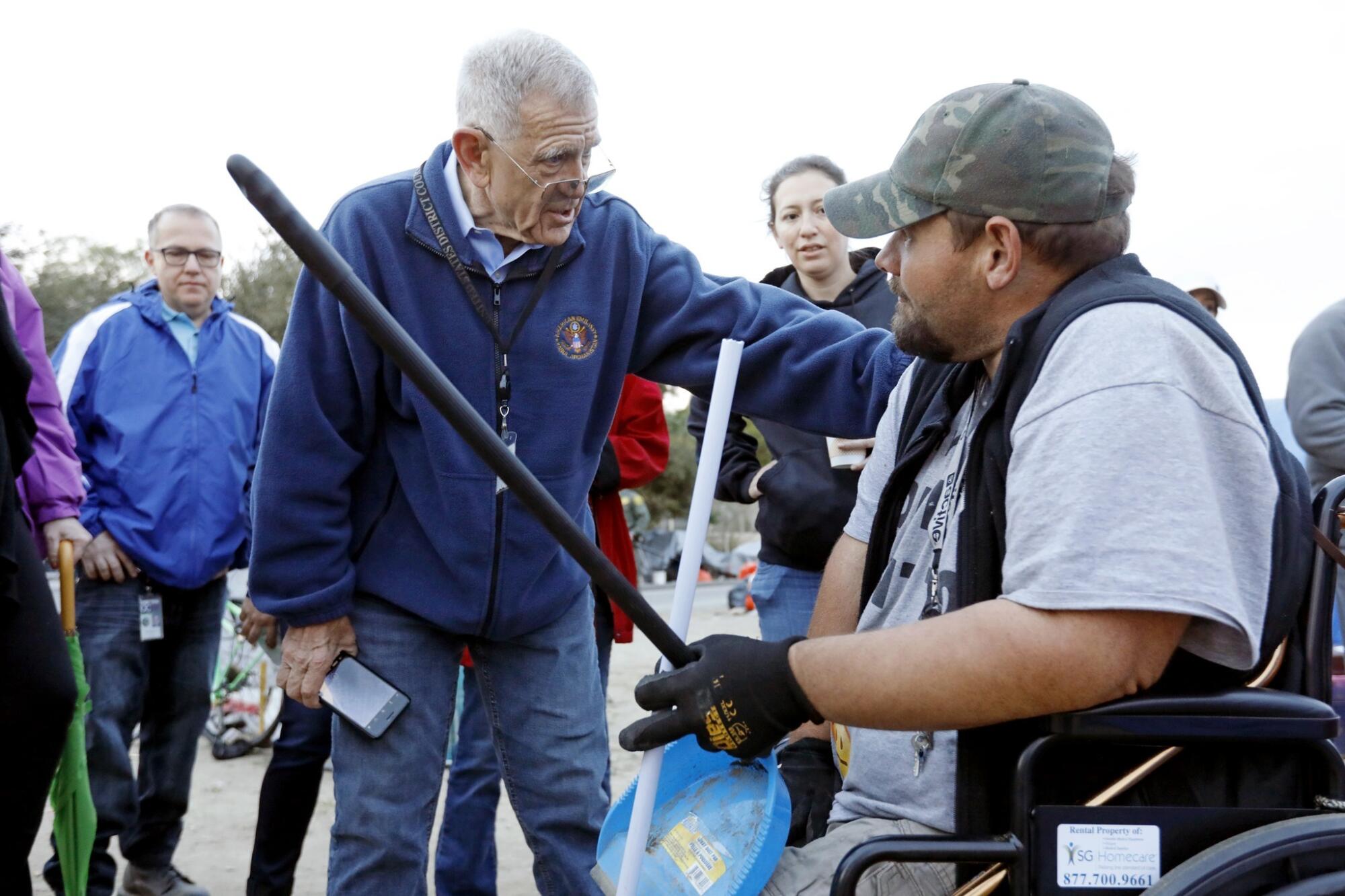
“The thing about Judge Carter is he’s a hands-on judge,” Sobel said. “He’s been to skid row numerous times. He’s been to Venice, San Pedro, Eagle Rock. He’s been out and about more than the city officials are.”
Carter, over the years, has made little attempt to disguise his efforts to improve conditions for homeless people. He sometimes acts more like a politician than a jurist — behavior that got him in trouble in Orange County.
Whether it’s at a function or on skid row, Carter will shake every hand and engage everyone in conversation.
“People always say to him, ‘Dave, you aren’t running for Congress, you can sit down,’ ” his wife said. “That should’ve been his career. He would’ve been perfect at that.”
Yet Sobel credited some of Carter’s success to the connections he has cultivated with business leaders and public officials.
Reggie Dominguez spent days self-isolating in a hospital parking lot, homeless and worried he had coronavirus. There are many more like him on skid row.
During a recent hearing in the Los Angeles case, for example, he insisted on getting L.A. City Atty. Mike Feuer’s cellphone number and told lawyers that he and Mayor Eric Garcetti had been exchanging emails since 5:30 a.m. That’s on top of meeting with almost all the members of the City Council and every member of the county Board of Supervisors.
“I’m going to call you Eric from now on, OK?,” Carter asked the mayor from the bench during the first of what have been many appearances. “I’m Dave.”
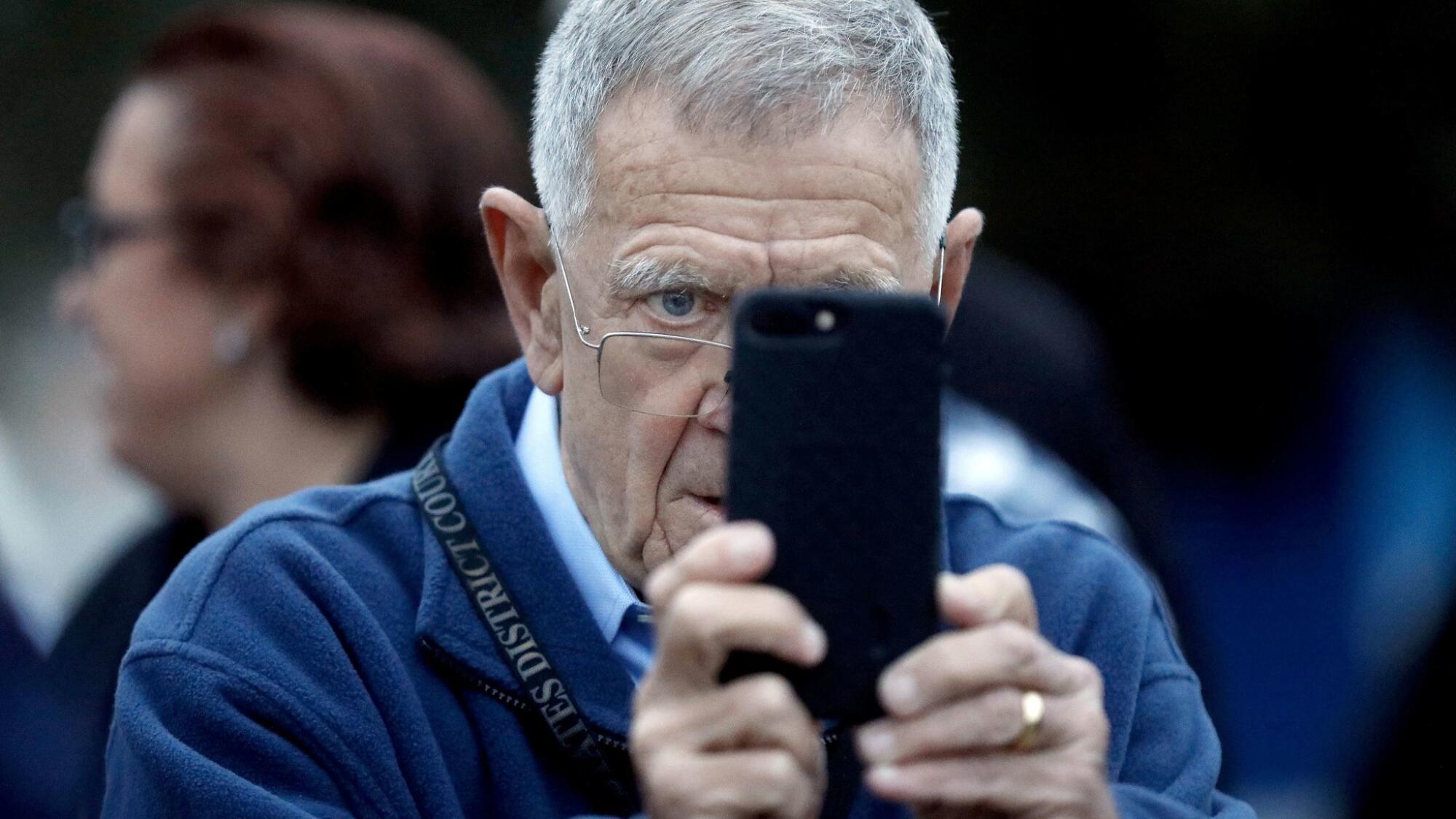
These conversations inside and outside the courtroom appear to be having the intended effect, putting pressure on politicians who have long focused on homelessness, but with mixed success. It was why the plaintiffs initially pushed for Carter to hear the case, and why both city and county officials have willingly come to the table to talk about solutions.
Lately, the judge has taken a particular interest in how homeless people are getting to the city’s new shelters in city recreation centers and how medical care is being provided there. One recent Sunday, he joined L.A. City Councilman Mike Bonin for a tour of shelters in Westchester and Westwood.
“He tried to not identify as a judge and told people he was my oldest staff member,” Bonin said.
Carter practiced social distancing most of the time, Bonin said, but talked to almost everyone at the shelter and even measured the distance between the cots to make sure they were indeed six feet apart to slow the spread of the coronavirus. He then buttonholed a few Los Angeles police officers, peppering them with questions about why they were taking people’s temperatures.
At first, the officers were reluctant to talk. “So he called Michel Moore,” Bonin said, referring to the LAPD’s chief.
The officers opened up, and Carter then joined them on a bus ride to pick up more homeless people.
::
One of Carter’s friends, Al Anderson, isn’t surprised the judge is risking his life for homeless people during the coronavirus pandemic.
The two met in the Marines during the Vietnam War. Fifty-two years ago this month, Carter’s unit attempted to take a hill in the battle of Khe Sanh. He was badly wounded and spent the next year in the hospital. The experience, Anderson said, left Carter scarred, but also defined the rest of his life.
Anderson has watched Carter’s star rise, presiding over trials involving the Mexican Mafia and Aryan Brotherhood. Carter, he said, has always been willing to put himself in harm’s way for the right reasons.
“He has been making a mark, and he is more so doing it now, but in a different way,” said Anderson, 76, who can’t leave his home because he’s had several bouts of pneumonia, putting him at high risk for severe COVID-19. “He’s championing that part of society that has been overlooked and would be overlooked more if it wasn’t for what he’s doing.”
Carter’s wife echoed that, saying, “He’s always told me, ‘Mary Ellen, I shouldn’t be here. I fought in the war and I’m not afraid like other people, this doesn’t frighten me. I’ve been given this second chance.’”
Carter wears a Purple Heart Medal pin on the lapel of his suit jacket. He also earned a Bronze Star.
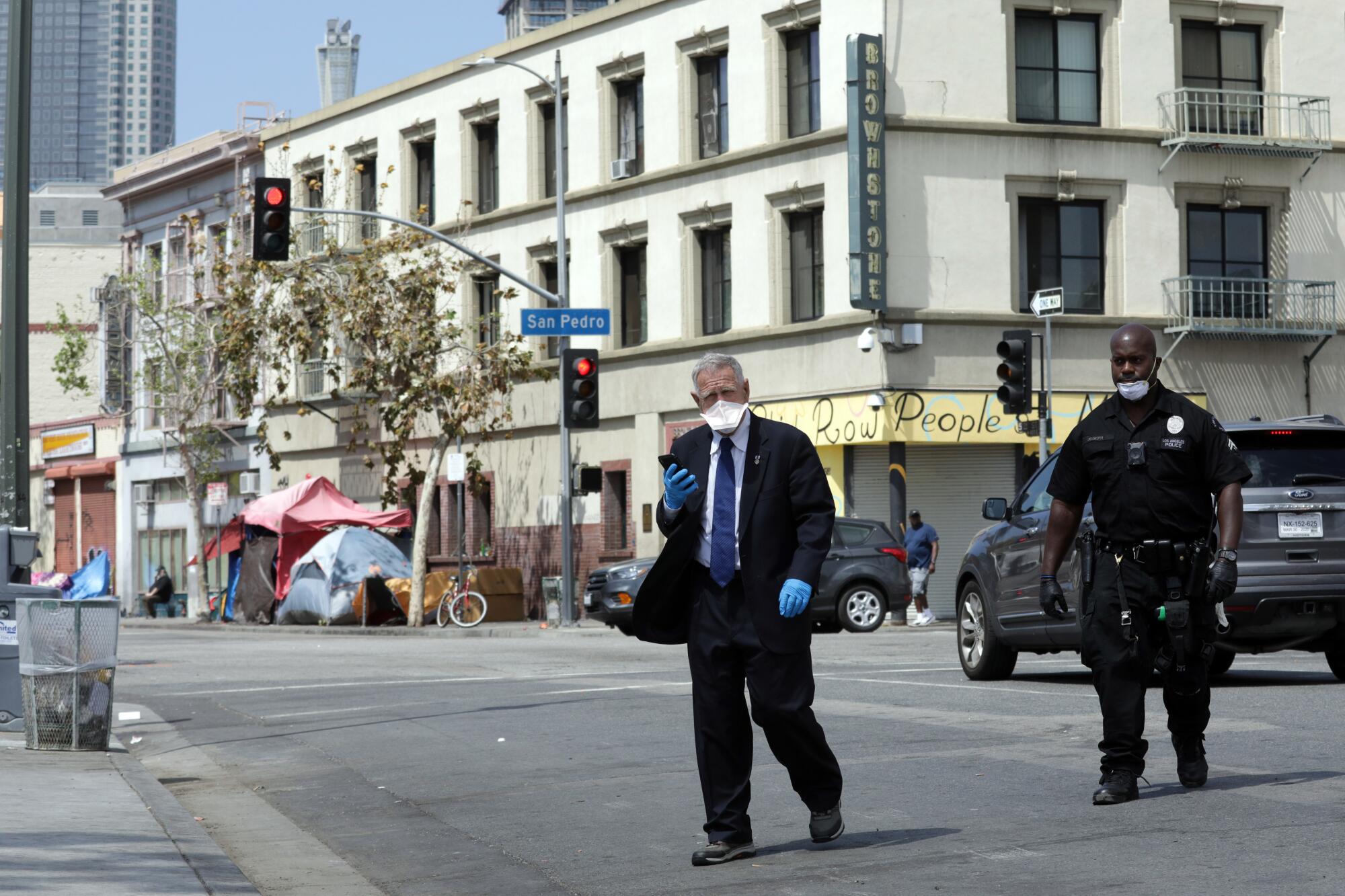
Back on skid row, staring through the rain at tent after tent, he recounted to the attorneys following him how bullets killed many people in Khe Sanh, but it was the wet and cold that killed lots of the men in his battalion.
“When the wind, it hits you,” he said, “you die of hypothermia.”
As the rain began to slow, Carter became enraged that the sidewalks were full of tents, making them impassable.
As he walked down 5th Street toward San Pedro Street, homeless people began to come out of their tents and clap. He waved and smiled and shook some hands.
Carter has focused much of his attention on this center of Los Angeles’ homeless community.
He has already helped facilitate some compromises. He is working on the broad contours of an agreement that would allow RVs and trailers to be parked near skid row on state-owned land and in a few parking lots that the city might lease. He also pushed the city to communicate that it wouldn’t be issuing citations for sleeping in campers during the pandemic.
Garcetti has repeatedly mentioned Carter during his nightly briefing on the coronavirus, recently giving the judge some credit as he explained that hand-washing stations will now be checked daily to make sure there’s water and soap, so homeless people can maintain basic hygiene.
These are all small deals, but they might lead to further cooperation between the city and county, and homeless advocates, some have speculated. That, in turn, could lead to more agreements that go beyond the response to the coronavirus crisis.
Still, Carter has acknowledged in court that no matter what they do, tens of thousands of people will continue to live on the streets, getting sick without adequate medical care and possibly spreading the coronavirus to others.
“By God, we’re going to get criticized for the lives we didn’t save. We’re never going to be accountable or known for the lives we did save,” he said. “You have got a chance for us to save an awful lot of lives.”
Times staff writer Doug Smith contributed to this story.
More to Read
Sign up for Essential California
The most important California stories and recommendations in your inbox every morning.
You may occasionally receive promotional content from the Los Angeles Times.
